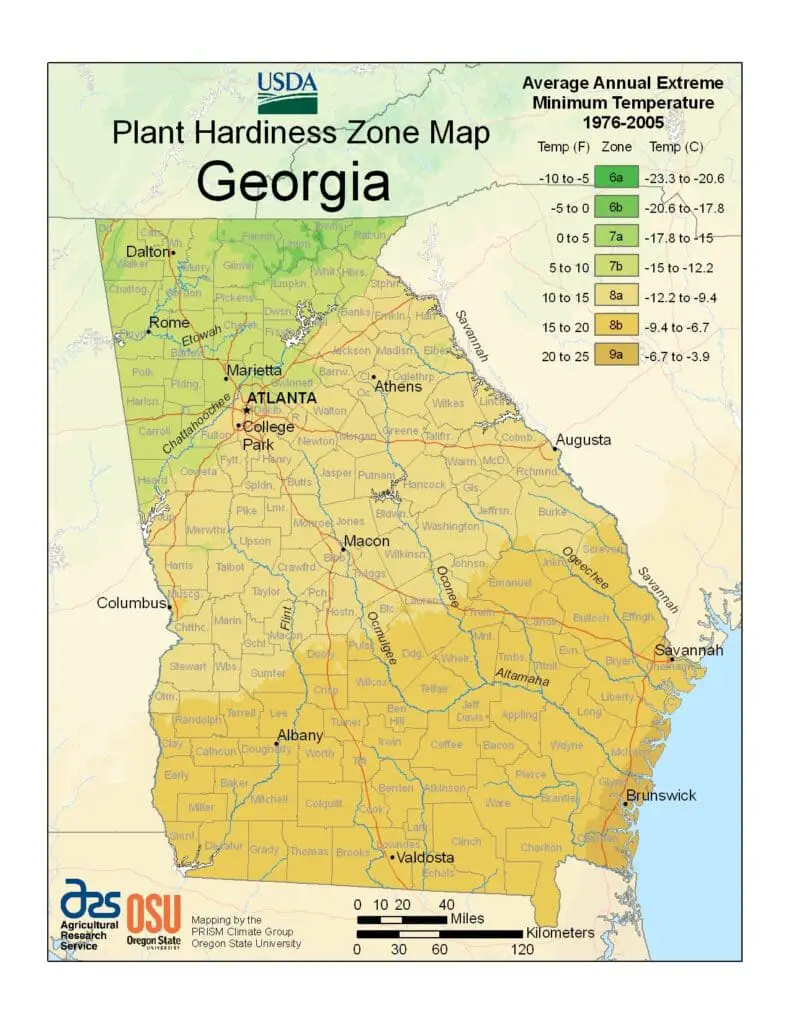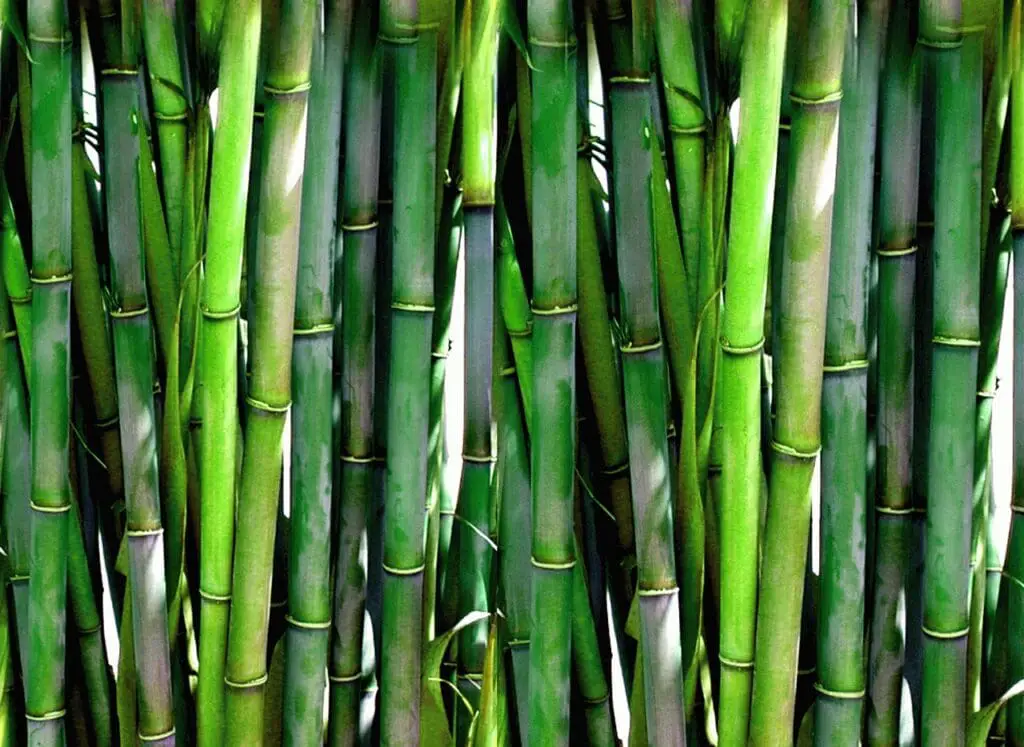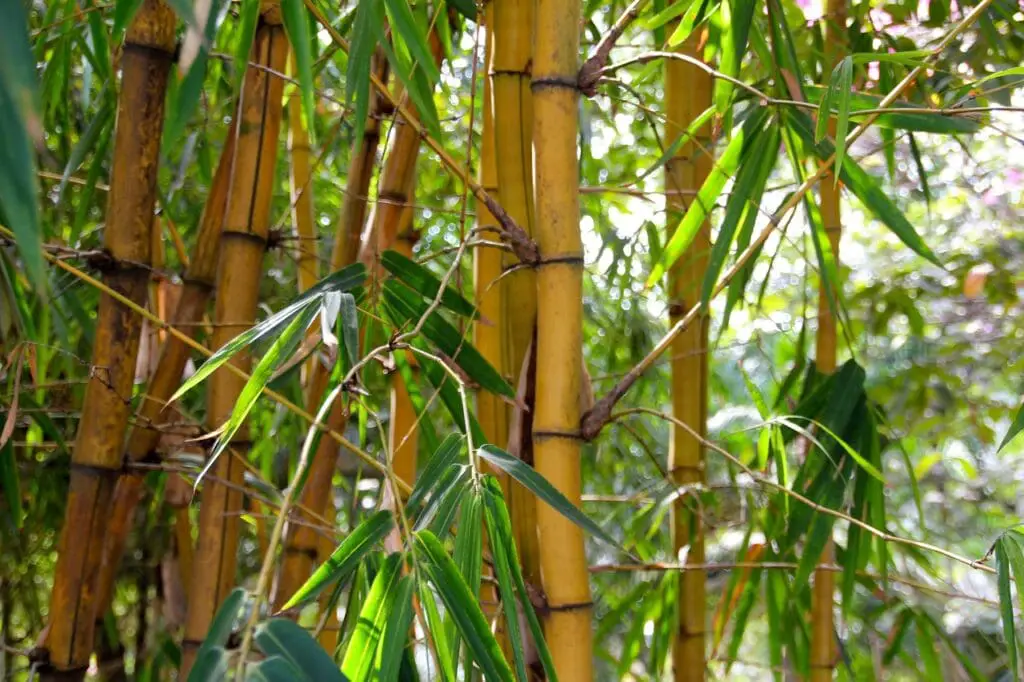Bamboo has the potential to thrive in the diverse climate zones of Georgia. With its mild climate, ample sunshine, and moist soils, Georgia offers ideal conditions for bamboo growth.
By understanding the various bamboo species available and their unique characteristics, Georgia gardeners and landscapers can harness the strength, privacy, and aesthetic appeal of bamboo to enhance their outdoor spaces.
Key Takeaways
- Bamboo can be grown in Georgia as there are a wide range of bamboo species suitable for Georgia’s different climate zones.
- Some cold-hardy bamboo species can be grown in zone 6b or higher, while many tropical bamboo species will thrive in zones 8a or higher.
- Bamboo is a versatile and sustainable plant that offers privacy, can be used for making furniture, paper products, and construction materials, and is also used in textiles and to make musical instruments.
- Bamboo grows quickly and is environmentally friendly as it doesn’t require pesticides or fertilizers.
Can Bamboo Thrive in Georgia?
Bamboo has the potential to thrive in Georgia due to its wide range of species adaptable to different climate zones and its ability to grow quickly and withstand various environmental conditions. However, there are certain challenges in growing bamboo in Georgia that need to be considered.
Bamboo cultivation techniques involve selecting the appropriate species that can tolerate the specific climate and soil conditions in Georgia. Some cold-hardy bamboo species can be grown in zone 6b or higher, while many tropical bamboo species will thrive in zones 8a or higher.
Additionally, providing adequate moisture is crucial for bamboo growth, as they require moist soils. The hot and humid summers in Georgia can be favorable for bamboo growth, but they may also lead to increased pest and disease problems.
Overall, with proper species selection and care, bamboo can indeed thrive in Georgia’s climate.
Ideal Climate for Bamboo
The climatic conditions in Georgia are conducive to the growth and cultivation of a wide variety of bamboo species. Bamboo thrives in mild climates with plenty of sunshine and moist soils, making Georgia an ideal location for its cultivation. When it comes to bamboo planting techniques, it is recommended to prepare the soil by adding organic matter and ensuring good drainage.

In terms of the best bamboo varieties for Georgia’s climate, there are several options to consider. For colder regions like zone 6b or higher, cold-hardy bamboo species such as Wolong Bamboo and Giant Leaf Bamboo are suitable choices. In warmer regions like zone 8a or higher, tropical bamboo species like Golden Bamboo, Temple Bamboo, and Henon Giant Gray Bamboo can thrive.
Additionally, Incense Bamboo is a fast-growing species that adds texture and contrast to gardens and landscaping designs in Georgia.
Bamboo Propagation and Growth
Propagation and growth of bamboo can be achieved through division, which is a common method used in gardening and landscaping projects. To propagate bamboo through division, the clump is carefully divided into smaller sections, each containing several culms and a portion of the root system.
This method allows for the creation of new bamboo plants that retain the characteristics of the parent plant. It is important to choose healthy, mature clumps for division to ensure successful growth.
When planting the divided sections, it is recommended to provide them with a well-draining soil that is rich in organic matter. Regular watering and adequate sunlight are essential for the growth of bamboo. Additionally, applying a balanced fertilizer during the growing season can help promote healthy growth.
By following these best practices, bamboo can thrive and reach its full potential in Georgia’s mild climate.
Benefits of Bamboo in Landscaping
Bamboo’s versatility and aesthetic appeal make it an excellent choice for enhancing the visual appeal and functionality of landscaping designs. The advantages of using bamboo in landscaping are numerous.
Firstly, bamboo provides privacy with its tall stalks, making it an ideal option for creating natural barriers or screens.
Additionally, bamboo can be used creatively in gardens by adding height and interest to the landscape. It can be strategically placed to create focal points or to frame certain areas of the garden.



Furthermore, bamboo’s unique texture and color variations add depth and contrast to the overall design. Whether used as a backdrop for colorful flowers or as a standalone feature, bamboo can create a sense of tranquility and beauty in any garden or landscaping project.
Growing and Maintaining Bamboo
When it comes to growing and maintaining bamboo in Georgia, there are a few common problems that gardeners may encounter. One issue is the spread of bamboo, as some species have a tendency to become invasive and take over the surrounding area. To mitigate this, it is recommended to choose clumping bamboo varieties rather than running types. Clumping bamboo stays in a contained area and is easier to control.
Additionally, selecting the best bamboo varieties for privacy screens is important. Popular choices for privacy screens in Georgia include Wolong Bamboo, Giant Leaf Bamboo, and Incense Bamboo. These varieties have dense foliage and tall stalks, providing excellent privacy and adding interest to the landscape.
Proper maintenance, such as regular watering and pruning, will help ensure the health and beauty of the bamboo plants.
Tips for Successful Bamboo Cultivation
To ensure successful cultivation of bamboo, it is essential to provide the plant with the right conditions, including ample sunlight, moist soil, and a mild climate.
Bamboo thrives in mild climates with plenty of sunshine and moist soils. It is important to choose the appropriate bamboo species for your climate zone in Georgia. Some cold-hardy bamboo species can be grown in zone 6b or higher, while many tropical bamboo species will thrive in zones 8a or higher.
Common bamboo problems include invasive spreading and lack of control. To prevent spreading, it is recommended to plant bamboo in containers or install underground barriers. Regular maintenance is also necessary, including pruning to control growth and prevent overcrowding.
Adequate water supply and occasional fertilization are important for healthy bamboo growth. By providing the right care and maintenance, bamboo can be a beautiful and sustainable addition to your garden or landscaping project in Georgia.
Frequently Asked Questions
Q: Does Bamboo Grow In Georgia?
A: Yes, bamboo can grow in Georgia.
Q: What is clumping bamboo?
A: Clumping bamboo refers to a specific type of bamboo that grows in clusters, unlike running bamboo which spreads underground.
Q: What is the hardiness zone for growing bamboo in Georgia?
A: Bamboo can generally grow well in hardiness zones 7-10, which includes most regions of Georgia.
Q: Can bamboo be used in gardens?
A: Yes, bamboo is commonly used as an ornamental plant in gardens due to its unique appearance and growth habits.
Q: Which variety of bamboo is popular for growing in Georgia?
A: Henon bamboo is a popular clumping bamboo variety that is well-suited for growing in Georgia.
Q: Is bamboo a hardy plant?
A: Yes, bamboo is known for its hardiness and can thrive in various climates, including subtropical regions like Georgia.
Q: Can bamboo be used as a hedge or windbreak?
A: Yes, bamboo can make an excellent hedge or windbreak due to its dense growth and tall stature.
Q: What are the typical heights of bamboo in Georgia?
A: Bamboo can grow up to 30 feet tall or even more, depending on the specific species and variety.
Q: What are some common uses of bamboo in the U.S.?
A: Bamboo is commonly used for construction, furniture making, crafts, and as a sustainable alternative to traditional materials.
Q: Does bamboo spread rapidly?
A: Unlike running bamboo, clumping bamboo spreads slowly and is easier to control in garden settings.
Conclusion
In conclusion, bamboo can indeed thrive in Georgia due to its mild climate, ample sunlight, and moist soils. The state offers a variety of bamboo species that are suitable for different climate zones, ranging from cold-hardy species in zone 6b to tropical species in zone 8a.
Bamboo is a sustainable plant that requires minimal maintenance and does not need pesticides or fertilizers. It provides privacy, height interest, and texture to gardens and landscapes.
Popular bamboo varieties in Georgia include Wolong Bamboo, Giant Leaf Bamboo, Golden Bamboo, Temple Bamboo, Henon Giant Gray Bamboo, and Incense Bamboo.

